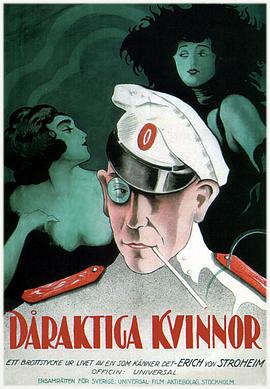详细剧情
长篇影评
1 ) Con man,gigolo 蒙地卡罗的传说
流连在蒙地卡罗赌场的王公贵族不计其数,他们常常号称来自欧洲某个没听说过的小国,实则大部分的身份都值得推敲。他们举止优雅,谈吐不俗,让来自德克萨斯的石油大亨遗孀们,寂寞的外交官妻子们和家教保守的纽约长岛debutante们为之神魂颠倒。他们始终眉头深锁,站在爬满天竺葵的露台上眺望远方——他的祖国——由于政治斗争和革命,他们流亡在蒙地卡罗,急需一大笔金钱支付家族的债务,洗清家族的名誉,或者组织一支反抗军夺回失落的王位。在真假难辨的眼泪和花言巧语里,这些地理历史不怎么好的太太小姐们纷纷自告奋勇充当救世主,大义凌然的取出支票簿搭救落难王子,顺便以身相许打包奉送。于是这些“王子”、“贵族”们又拿到了好几个月甚至好几年的生活费和赌资,之后故技重施搜寻下一个猎物。
这就是con man,他们的身份unspeakable,他们的手段unbelievable,他们的结局unpredictable。
电影里最早作为主角的con man大概是施特罗姆1921年的Foolish Wives ,他本人饰演一个俄国的贵族军官,在蒙特卡罗租一栋别墅,和两个表姐(情人?搭档?)生活在一起,早餐是新鲜的公牛血和鱼子酱。他试图引诱住在Hotel De Paris的大使太太,一个年轻,单纯,喜欢幻想的美国女人。这种凭着好运气嫁到上流社会的女人到欧洲游历时一方面总是想方设法结识各国王公贵族,好在回国后有料吹嘘,表示自己交游广泛;另一方面,粗浅、乏味的美国男人怎么能和worldly,sophisticated的欧洲绅士相提并论呢?于是她很快被施特罗姆吸引,钻进圈套里。
施特罗姆是一个 you love to hate 的人,他下流粗鄙,却有一种难挡的魅力,他假扮的俄国军官懂得各种在蒙地卡罗吃喝玩乐的方法和去处,简直是最佳向导,陌生的游客到了享乐主义的圣地蒙地卡罗,又有大笔的闲钱,不正是需要一个这样能玩会玩的人带着going places,seeing things吗!
电影里面他最终没有得逞,而是有一个颇苍凉的结局——在身份被识穿,走投无路时,他试图强奸收留他的主人家的智障女儿,被主人打死,尸体丢进下水道。
那么大多数的con man结局又如何呢,如今世道,贵族是凤毛麟角的稀罕玩意,贵族式的行骗也需要高超的技巧,付出昂贵的成本,试想想为了佯装贵族而培养出高雅的品味,自然不露痕迹的优雅做派和举止岂是一朝一夕可以办到的呢!何况出来玩的人更多是金睛火眼,轻易不受糊弄。这一行渐渐式微了。而蒙地卡罗更多的是摆明车马依靠原始本钱讨生活的男生,这就是另外一个古老职业——gigolo。
电影里的gigolo实在是恒河沙数,很多时候都只是人肉布景板而已。真正让人有印象的,还是田纳西威廉斯的《爱君风流》(Sweet Bird of Youth)里面保罗纽曼那个心怀梦想,下海找机会而最终梦想破灭,泥足深陷的Chance Wayne ,他的client, 亚历山大(杰拉汀珮芝),也是一个sympathetic的角色,她演绎把一个在事业瓶颈期彷徨,绝望的女明星。一个larger-than-life的女人,她的情绪就像活火山一样随时处在爆发的边缘,得戚时放浪的笑声,失落时fragile的眼神,硬是盖住了保罗纽曼的光芒。
Con man和gigolo,没有他们,蒙地卡罗的传奇色彩就失掉大半,毕竟那些prepare for adventure的游客们,谁的黑暗的内心不是想要一段疯狂愚蠢,yet short-lived的异国艳遇,然后pay for the bill呢?
2 ) [Film Review] Foolish Wives (1922) 7.3/10

Erich von Stroheim’s third feature, the most expensive film made at that time, cost more than $1 million, this restored 142-minute version makes most of the surviving film footage to present its entirety, still elisions are evident, especially relative to the downfall to the protagonist “Count” Sergius Karamzin (von Stroheim), an imposter of aristocrats with his two accessories-and-kissing-cousins, “Princess” Vera and Olga Petchnikoff (Busch and George), the final blow is omitted.
Renting a cliffside castle in Monte Carlo (a magnificent replica built in the Hollywood studio) and tucking in caviar for breakfast, Sergius and co. must earn extra lucre to maintain their opulent existence besides the usual business with the banknote counterfeiter Cesare Ventucci (Gravina), who, inexplicably, still lives in the sleazy environs with his dim-witted but nubile daughter Marietta (Polo). When a US envoy arrives to meet Albert I, Prince of Morocco, Sergius finds his next quarry in the person of Helen Hughes (DuPont), the 21-year-old wife of Andrew Hughes (Christians, in his last picture), the said envoy.
This reviewer hopes he is not the only one who finds Sergius’ chaining-smoking, monocle-sporting, continental noble mannerism appallingly off-putting, but as beauty is in the eyes of its beholder, Ms. Hughes, derisively denoted as an unsophisticated, incredulous, cocooned American wife, embraces Sergius’ guise wholesomely, much to the chagrin of her husband, and precariously puts her own reputation on the line during a stormy night when she goes out with Sergius alone, saved by the fortuitous appearance of a passing-by monk (De Brulier), yet the unmitigated grubbiness of Sergiusnever relents, he soon easily ropes naive maid Maruschka (a woebegone Fuller) into giving up her petty savings on a false promise of matrimony, and simultaneously sows the seed of his undoing, which catches up with him after successfully extracting money from Ms. Hughes out of her own volition.
It smells like a vanity project, but von Stroheim at least manages to transmute his production excesses into something of a spectacle, not least for its money shots of a turret engulfed by fire and the actors’ desperate derring-do of jumping onto a spring mattress. Although the attendant metallic store by András Hamary of this restored version may not cleave closely to the emotional ups-and-downs of the narrative, von Stroheim’s FOOLISH WIVES, for what it is worth in its pieced-together form, like the meta-novel Mr. Hughes reads, cunningly reflects a satirical sting out of its full-fledged enterprise of a cautionary tale.
referential entries: Billy Wilder’s SUNSET BLVD. (1950, 9.0/10); F.W. Murnau’s FINANCES OF THE GRAND DUKE (1924, 6.3/10), SUNSET, A SONG OF TWO HUMANS (1927, 9.0/10).





















日落大道三十年前的Erich von Stroheim导/演功力领教了。他的极繁主义首先是为故事服务的,排场第二,所以奢华但又细腻敏锐,很有味道的默期大片,幕后轶闻也比比皆是,真是传奇人物。
冲动必须是赤裸的。只认为冲动会满足于一个环境给它提供或保留的东西是绝对不够的。这种满足不是一种安命,而是一种巨大愉悦,冲动从中发现了自己选择的力量,因为从深刻意义上看,它是改变环境、寻找新的环境开发、分割的欲望,因而它会满足这个环境提供的哪怕是最低级的、最令人厌恶的、最令人恶心的东西。冲动的愉悦不能用情愫来衡量,即不能用可能对象的内质来衡量。//吉尔·德勒兹.电影1:运动-影像.[M].p207
第一次看默片看的那么投入...
写实主义。导演对于画面里人物行为的精准捕捉与超脱时代的环境写实确实让人眼前一亮,也是很罕见地把台词卡当做“声音”运作而不是第二“画面”的默片导演,可惜太残了。
人物刻画,大片。批判。
漂亮朋友覆灭记
施特罗海姆演的角色怎么都是大奸大恶之人呢 自己当导演咋还不给自己安排点好角色
默片似乎都限制了施特罗海姆的发挥,这次是对女性迷恋男性外表的批评,片中女主角两次遇到同一个军官做了绝妙的隐射
片中暴风雨后的夜戏在当时能有如此处理,难得。80分
齐人有一妻一妾?去死的军官和绅士,你他妈 根本就不是男人,非常的写实主义加细腻手法,最后的结尾非常伟大,影片有一种放纵的虚无意味
【油管140分钟 https://www.youtube.com/watch?v=1mmNCCp_IbA】情人节,看个大片,里面有一对俄国猎狼犬,好像除了俄版《战争与和平》,我还没在哪部电影中看见它们这么多镜头
8.3/10。①男主冒充伯爵勾搭上数个女人(美国外交官的妻子A、女仆、少女)并对她们实行性虐待+骗钱,最终他因此被人杀死。②几段大场面的调度水平很高;许多布景为达到最大的拟真效果花了海量金钱与精力;摄影水平很高(有的地方甚至把夜晚打成了白天);表演模式比起当时其他默片相对自然主义(符合写实的影调);暴风雨划船那段和赌场大火那段处理(剪辑调度美术等)地非常好。③作为传统故事片三条叙事线除了男主与A的线外另两条都或多或少不完整,这种不完整还导致叙事节奏较拖,加起来扣1.5。
111 min / 35 mm / INT. FR. Ciné-concert de Sheep Got Waxed
太可惜了,可以明显看出删减造成的不对称,140分钟的最新添加版本更让人好奇完整版本是怎样的宏伟,几条线中与美国大使夫人的线非常丰富,但其他两条线就很简略了,但即使这样也不妨碍施特罗海姆史诗叙事的强大技能,一战过后对欧洲所谓贵族精神堕落毫不留情地批判,他们用虚妄的金钱和逢场作戏来维持虚幻的尊严,殊不知自己进入到道德的陷阱中,女人用了惨痛的代价终于看到了伯爵的真面孔,曾经的真却变为了假,这个世界远不是你所看到的那个样子,布景太厉害了,完全以假乱真,最后那场大火的群戏调度更是叹为观止,当然最终的悲剧是伯爵的宿命,这位花花公子和财迷终于找到了他最好的归宿,被上流社会抛弃后贫民窟的幽暗下水道
3.5星,可以想象如果没有被弄的支离破碎残缺不全这一定是一部伟大的电影,现存的这个版本对后半部分的影响尤其的严重。施特罗海姆称这是有史以来第一部“百万电影”,拍摄成本超过了100万美元。评论则认为这是施特罗海姆导演生涯中排在第三的佳片。三条线如今只能够清晰的看到一条线,也就是和大使夫人的一条线,和女仆以及少女的线都有点不太清晰但其实这也无妨可是在后半段失去了很多关键情节就有点让人莫名了。相比雷雨和着火的桥段其实还是更喜欢一开始男主角与大使夫人初遇的那个桥段,这一部分情绪的微妙变化拍的格外细腻。其他小的细节尤其是两个女骗子都被抓掉了假发套,也可算是巧妙的黑色幽默。结尾被扔进了下水道不但冷酷而且极其自黑。。。
可能已经看了另一部,我只想说...导演,你咋就这么爱这种剧情了,还都是亲自扮演里面花花公子的角色,而且那套服饰基本一样啊....然后,我本人更喜欢另一部。
虽然是默片,剧情还是很狗血的,性虐骗子覆灭记。
对于这种贵族题材电影毫无感觉,好在制作和摄影都无可挑剔,叙事到也不算太冗长,配乐重复来重复去,单调得令人发指。
跟Blind Husbands真的不是姊妹篇吗?甚至连片名都是对偶的
没人觉得姜文其实长得蛮像这时候的Stroheim的?情节看似狗血,但主人公保持自我到最后一秒这点,和后三十年的好莱坞比特别难得。